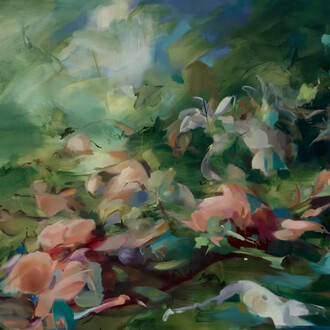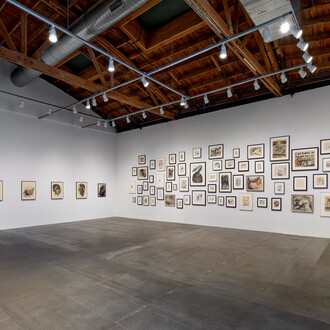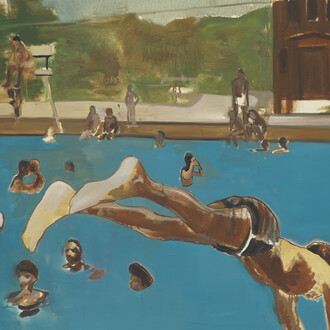For Jason Rhoades, the car was a vehicle of artistic pursuit, both readymade sculpture and American idol. Hauser & Wirth Los Angeles will dedicate an entire gallery at its Downtown Arts District location to a yearlong exploration of Rhoades’ art via the subject of cars and car culture.
Known for the driving imagination and ambition of his work, as well as, at times, its reckless provocation and overwhelming materiality, Rhoades (1965 – 2006) was a world builder for whom the making of sculptures and the creation of narratives were intertwined. His epic-scaled installations established him as a force in the international art world in the 1990s while he was based in Los Angeles. ‘Drive,’ will unfold over a series of thematic iterations, an ever-changing exhibition of Rhoades’ sculptures, drawings, videos, and multiples—enriched by archival materials, public programs, and contemporary perspectives.
This February ‘Drive’ will open with The Parking Space, featuring a Chevrolet Caprice and Impala, a Ferrari 328 GTS, and a Ligier microcar, parked in the gallery alongside a video in which Rhoades fervidly discourses on his concept of the Car Projects. While driving around Los Angeles in 1998, Rhoades explains the relationship of cars to his art (parking is equated with sitting in a sculpture) and to daily practice (driving between the house, the studio, and stores are time and space for the mind to race and wander). He expounds on cars as icons of art history (Marcel Duchamp and Francis Picabia speeded modern art forward with their mechanized abstractions), identifiers of class (you are what you drive), and environments of control. The radio is tuned to Power 106 FM and as the world streams by to the propulsive hip-hop beat, the romance of cars seems irresistible.
In April, the installation will be reconfigured to accommodate a lounge and become The Pit. An influx of archival materials will be key to unpacking the various episodes of Rhoades’ Car Projects, starting with the Caprice and the 1996 exhibition ‘Traffic.’ Not only did the artist cut a deal with CAPC musée d’art contemporain de Bordeaux, France the organizers of the show, to go in on buying the car as a transactional work of art, but he later leveraged its symbolic value by trading the Caprice for a Ferrari.
This summer the exhibition’s focus will swerve onto The Racetrack. A set of half-scale Nascar-style cars, custom jackets, and colorfully painted tire barriers are among what remains of ‘The Snowball.’ Staged in California as a daylong racing event at Willow Springs speedway, ‘The Snowball’ was ultimately destined for the 2000 Venice Biennale and Rhoades’ collaborative work for the Danish Pavilion. In September, The Garage will cover the final stretch of ‘Drive’ with a selection of framed works on paper and a major sculptural installation.
Throughout the year, the line-up for ‘Drive’ will feature a range of public programs. A film series centered on cars and the city of Los Angeles will be curated by film historian and critic Elvis Mitchell. A theatrical staging of the playwright Charles Mee’s ‘Under Construction,’ which was inspired by Rhoades’ art in its collage depiction of America today, will be presented as part of Hauser & Wirth’s Performance Project.
Organized as an investigation in real time, ‘Drive’ invites people to approach the exhibition like a garage of art and ideas, in which cars are coming and going, and tinkering is a productive state of mind. As an artist, Rhoades was keenly attuned to sources of cultural power and weakness. When he put the internal combustion engine on art’s pedestal, was he presciently placing the car where it belongs for a greener tomorrow? The car as a subject in Rhoades’ art continues to drive and trouble the imagination today.
















